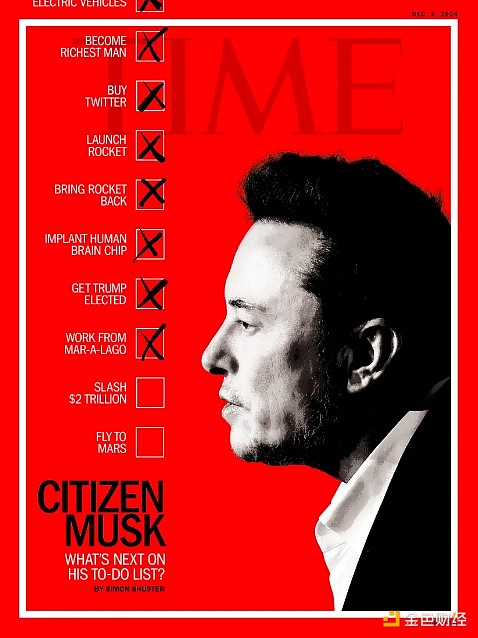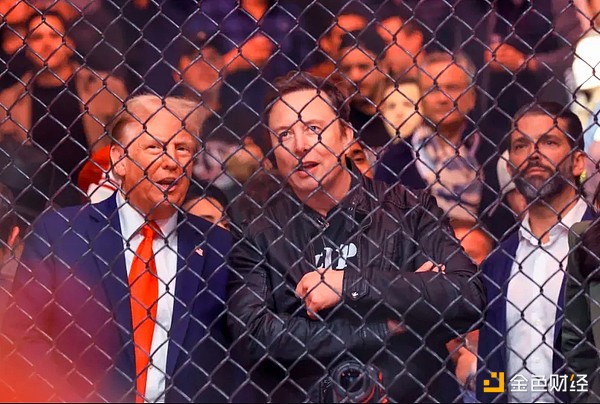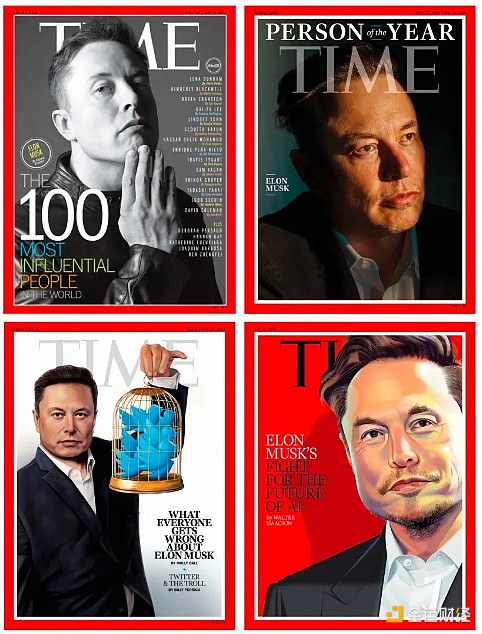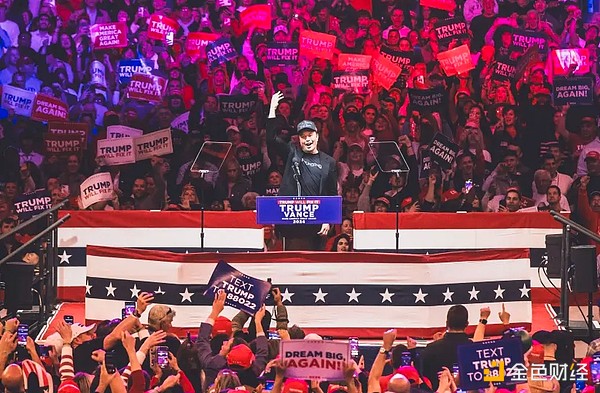Standing next to Musk, even Trump seems almost in awe; rather than being a boss, he is more like a peer, as the planet and its challenges are not big enough for him.
Written by: Simon Shuster, Time
Translated by: Deng Tong, Golden Finance
Who did we just elect? At the top of the Republican ballot are two names: Donald Trump and J.D. Vance. But part of this crazy November left the impression that others have already seized our collective fate.
We have come to know the various roles he plays—the person who acquired Twitter and fired more than half of its staff, the inventor who revitalized the space program, the car manufacturer whose new truck makes children stop and stare on the sidewalk. Suddenly, Elon Musk has entered the political arena, hosting rallies, guiding government appointments, and setting the agenda for the next President of the United States.
For more than three years, he has been one of the richest and most powerful people in the world. Markets have soared and plummeted based on his tweets. Astronauts fly aboard his spacecraft. The military advances using signals from his satellites. Conspiracy theories have become mainstream through his embrace. But it is only under the spotlight of these elections that his influence is fully revealed.
Since the time of William Randolph Hearst, who propelled Roosevelt's rise nearly a century ago, no ordinary citizen has lived so prominently in so many aspects of American life, now incorporating the power of politics into his will. Standing next to him, even Trump seems almost in awe; rather than being a boss, he is more like a peer, as the planet and its challenges are not big enough for him.

Photo illustration provided by Time magazine (Source image: NurPhoto/Getty Images)
Currently, they are connected like partners, through the benefits they trade and their shared desire to dismantle government institutions. They may temporarily issue commands in unison. But their agendas are not aligned on everything. Both are capricious, impulsive, and used to being in control. What happens if they start to clash?
In such a battle, Musk may not come out on top. History is littered with the wreckage of kingmakers who waged war against the leaders they appointed. No matter how much wealth or influence Musk accumulates, the tools of national power will remain in the hands of the president, and if he decides to use those tools against the billionaire who helped him return to the White House, things could get messy.
Ultimately, the durability of their partnership may depend on Musk's motivations: What drives him to become a MAGA prophet? If what he wants is money, then the mission is accomplished.
Due to the frenzy of investors over Tesla stock, his wealth soared by more than $50 billion in the week after the election, peaking at over $320 billion. But wealth has never been Musk's obsession. He has staked his fortune on lunar passion projects, like building greenhouses on Mars, which is enough to prove that his dreams are different from the ordinary Klingons on Trump's starship. (Note from Golden Finance: Klingons are a warlike alien race in the fictional universe of Star Trek.)
Those close to Musk say that since founding the rocket company SpaceX in 2002, his ultimate goal has not changed. (The company's investors include Marc Benioff and Lynne Benioff, owners of Time magazine.) His favorite T-shirt reads: "Occupy Mars." "Everything is for this mission," a member of Musk's social circle recently discussed his plans. "He just realizes that controlling the U.S. government budget, directly or indirectly, will get us to Mars during his lifetime. Doing it privately would be slower."
This does not mean that American taxpayers will foot the bill for Musk's interstellar travel dreams. But when a quirky dreamer is in charge of the government, the public often pays the price. Millions of Americans, from retired factory workers to debt-laden graduates and newborns, benefit from the social programs Musk has promised to cut. Despite Musk tweeting multiple times a day to his 205 million followers, he has refused to answer reporters' questions since becoming an advisor to the elected president, including this time. He has not explained his contacts with U.S. adversaries from China, Russia, to Iran. He has also not addressed the conflicts of interest arising from playing a key role in a government under investigation by regulators.
So far, Trump seems willing to cooperate. In his victory speech on November 6, he spent four minutes praising Musk, the "super genius" who helped him run ground campaigns in Pennsylvania, reportedly paying canvassers to knock on 11 million doors and hiring vans to transport Amish voters to polling stations. "We have a new star," Trump cheered on stage in Florida. "A star is born—Musk!" It was not until about 19 minutes into the speech that the incoming president returned to the teleprompter and remembered to thank his voters.
Musk's significance to Trump's campaign goes far beyond the $120 million he invested, the ground projects he established, or the social media boosts he provided. For many young people flocking to Trump, Musk is an ideal embodiment. He injects originality and possibility into familiar nostalgic behaviors. If Trump’s promise to dismantle corrupt institutions excites supporters, Musk represents the commitment to create new things and solve problems. Trump appears less old at rallies, with the edge lord who plays Diablo bouncing around him. When Trump's opponents portray his team as a bunch of fools, the greatest innovator of our time, with a record of executing quirky plans, promises to cut $2 trillion in spending, making it even harder for his opponents.
No matter how frequently Democrats remind us that Trump's wealth comes from inherited money, multiple bankruptcies, and decades of corporate mischief, they cannot deny Musk's achievements as a businessman. Even the billionaire class's scourge, Senator Bernie Sanders, recently avoided criticizing him on a podcast: "Elon Musk is a very, very aggressive and capable businessman, and his achievements are impressive. He says he can do in a week what the government can do in five years, and in some ways, he is right."
As confidence in government plummets, many voters want to see a capable outsider, ruthless and independent, who knows how to use a massive machine to make it leaner, faster, and more efficient. Musk's commitment to cutting costs has created momentum and cover for reductions on a scale not seen in Washington for years. During Trump's first term, this agenda made little progress. Millions rely on government jobs and protections provided by regulators to guard against predatory corporations, such as those that have led us to misuse opioids and cigarettes to treat asthma. But small-government Republicans will be eager to follow Musk's lead, embroiled in ugly budget battles over federal waste and bloated welfare. Many Americans will support them.
During the campaign, Musk's most compelling argument was not on Joe Rogan's show or on the stage of a Trump rally. It was at the launch pad in Boca Chica, Texas, where Musk's aerospace company captured a returning rocket with a pair of mechanical arms, astonishing the world. If someone doing this is so passionately supporting Trump, can't Trump accomplish some of the things he promised?
Many voters seem to think so, especially young men whom Musk targets with bravado. "The most important factor here is that men need to vote," Musk told Rogan on the eve of the election. The next day, when 60% of white voters supported Trump, Musk tweeted: "The cavalry has arrived." But his appeal extends far beyond the manosphere. It has also resonated with a large number of voters who are tired of Trump's personality but excited about his policies. Television experts say these people need a "permission structure"; Musk provided that for suburban women like Betsy Stecz. When she was waiting in line for his October rally in Lancaster, Pennsylvania, she said, "Well, I can hold my head high and say I’m not ashamed to vote for Donald Trump." In her view, the reason is Musk.
Given the role he played in this victory, Musk may expect some return. But reports suggest that his position during Trump's transition has made some aides uneasy. For most of November, Musk camped at Mar-a-Lago, weighing cabinet picks and advising Trump on policy priorities. He golfed with the elected president, sat ringside with him at an Ultimate Fighting Championship event, and posed for photos with the Trump family; a grandson praised Musk on social media, claiming he has achieved "uncle status." Musk created a different term for his position: "First Partner."

On November 16, 2024, elected President Donald Trump, Tesla and SpaceX CEO Elon Musk, and Donald Trump Jr. (right) watch the UFC 309 match at Madison Square Garden in New York. Kena Betancur-AFP /Getty Images
Even such a statement is an understatement. Leaders from Turkey and Ukraine have had Musk listen in on their calls with Trump. Reports indicate that an Iranian envoy accused of attempting to assassinate Trump met with Musk to discuss de-escalation. (The Iranian Foreign Ministry denied the meeting.) When House Republicans invited Trump to a closed-door meeting on Capitol Hill, Musk trailed behind, with a "GUEST 1" label on the window of his car in Trump's motorcade.
At that time, Trump appointed him to lead a new entity called the Department of Government Efficiency. Its acronym, DOGE, is a nod to the dog-themed cryptocurrency Musk has promoted in a joking manner. But its mission is serious. Trump claimed he would "dismantle" the federal bureaucracy and "reorganize" its agencies. "This will send shockwaves through the entire system," Musk said.
It may also give Musk influence over many agencies that regulate his work. In the weeks leading up to the election, the National Highway Traffic Safety Administration announced it was investigating Tesla's autonomous vehicles following crash incidents. In June, California regulators ordered Tesla to "correct its ongoing air quality violations at the Fremont factory." Tesla stated that its cars are safe and that its facilities comply with environmental standards. SpaceX has also clashed with the Federal Aviation Administration, with Musk threatening to sue the FAA in September. A commentary in The New York Times found that his companies face at least 20 regulatory battles and investigations from "all corners of the government." Musk and several representatives declined to comment or respond to questions posed by Time magazine for this article, including potential conflicts of interest.
He has yet to explain what principles will guide him in cleaning up the bureaucracy. DOGE co-director Vivek Ramaswamy campaigned in the last Republican primary with a pro-business, libertarian stance. In contrast, Musk's political leanings are harder to determine. This summer, he described himself as "a moderate Democrat in history." He called climate change the defining challenge of our time. When Barack Obama ran for president in 2008, Musk waited in line for six hours to shake his hand.
His relationship with Trump is often unstable. They have starkly different views on tariffs, and Musk resigned as a White House advisor less than six months after taking the position in protest of Trump's climate policies. Five years later, Musk stated that it was time for Trump to "drive into the sunset," prompting a strong response. Trump remarked, "Musk should focus on getting himself out of the Twitter mess because he might owe $44 billion for something that may be worthless."
Trump has a point. Musk's acquisition of Twitter made little apparent business sense. By 2022, he paid at least twice the company's value and then spent weeks destroying its revenue sources and cashing in on its talent. He stated that under his leadership, the company's workforce shrank from 8,000 to about 1,500. Some posts he made on the platform (which he renamed "X") were seen as corporate self-harm. One was labeled as "the real truth" regarding anti-Semitic theories. (He later apologized.) Another shared conspiracy theories about the hammer attack that hospitalized House Speaker Nancy Pelosi's husband with a skull fracture. In response, dozens of companies, including Microsoft and Coca-Cola, pulled their ads from the platform. "Don't advertise," he told them from the stage at a conference last fall. "If someone wants to blackmail me with advertising, blackmail me with money, then get lost." Investment firm Fidelity assessed in October that X had lost nearly 80% of its value over the past two years.

Clockwise from top left: Mark Seliger for Time magazine, Mark Mahaney for Time magazine, Nigel Buchanan for Time illustration, Tim O'Brien for Time illustration
Musk seems unfazed. Even with most of the staff gone, the platform continues to operate, frequently ranking as the most downloaded news app in the Apple App Store. Major advertisers have returned. For some observers, all of this is enough to cheer Musk's acquisition, calling it a masterstroke of corporate efficiency. A member of Musk's social circle said, "What Elon did to Twitter is he went in, cleaned the room, and now it runs better than before." "So the sentiment is hoping Musk can do the same with the U.S. government."
This is a daunting task. Even fiscal hawks are hesitant about Musk's promise to cut $2 trillion in federal spending. This would require cuts to Medicare, Social Security, and other parts of the social safety net. Musk warned the nation to prepare for a period of "temporary hardship" as these cuts take effect. But it remains unclear whether he has the capacity to create them. DOGE will remain outside the government, with no authority to fire federal employees. Many budget experts expect it to behave like countless blue-ribbon panels, trying to pressure politicians to cut programs favored by voters but failing. When it comes to identifying waste, fraud, and abuse, Congress does not need help: it already has an oversight agency called the Government Accountability Office that is working to get the job done.
Many early fans of DOGE acknowledge the limitations of its potential but still celebrate it. Wall Street Journal columnist Andy Kessler wrote on November 17, "Yes, the Department of Government Efficiency may be a pipe dream, ultimately becoming as essential as the Ministry of Silly Walks from Monty Python." "But even if Musk's DOGE only cuts some bloat and saves a few hundred billion dollars, it's worth it."
During the campaign, Musk frequently spoke about the necessity for America to "live honestly" and "within its means." But if his social media platform is any guide, his goals may be more ideological than efficient. The stated goal of his Twitter acquisition aligns with one of the reasons he supports Trump: he claims he wants to save free speech in America. "Free speech is the cornerstone of democracy," he told Joe Rogan on the eve of the election. "Once you lose free speech, you lose democracy. Game over. That's why I bought Twitter." Multiple reports and studies have concluded that under his management, the platform has become a haven for hate and harmful content, partly due to his firing of its content moderation team.
When asked to explain his rightward shift, Musk often refers to the "work mindset virus," a term he uses to describe what he sees as America's leftward tilt, which he believes has sparked identity politics, cancel culture, and allegedly rampant online censorship. His resentment toward these forces is not merely political. During the pandemic, one of his children sought gender-affirming medical services, and Musk claimed he was misled into approving it. His transgender daughter, now 20 and estranged from her father, legally changed her name to Vivian Jenna Wilson in 2022. In a July podcast, Musk said his child "is dead, killed by the woke virus. I swear to eradicate the work mindset virus from now on."
Wilson responded the next day: "As a dead dog, I look pretty good." On November 5, as the election results became clearer, Wilson posted another message: "Blame those damn politicians and oligarchs who caused this," she wrote. "Take your anger out on them."
In ancient Greek, the term oligarchy means "rule by the few." Its earliest critic was Aristotle. In the 4th century B.C., the philosopher described it as a situation where "the property owners hold the government." In medieval Venice, the leaders of the oligarchic group practiced lifelong rule, sharing the same title as the one Musk has given to his new department: governor.

Elon Musk speaks at a rally for former President and presidential candidate Donald Trump. Sasha Leika—Rolling Stone / Getty Images
This system was most purely embodied in 1990s Russia, when a handful of businessmen acquired control of the national economy during the chaotic transition to capitalism. The Russian term for oligarchy is semibankirshchina—rule by seven bankers.
The most powerful among them was Boris Berezovsky, who used his media assets to help Putin win his first election in 2000, hoping the new president would share the spoils of power. Instead, the two began to quarrel. The Russian government soon forced Berezovsky into exile and confiscated his television network. The oligarch died bankrupt and alone in 2013 at his mansion in the English countryside. Authorities ruled it a suicide. To this day, his former media channels continue to convey the Kremlin's messages.
One of Berezovsky's close associates, Alex Goldfarb, now lives in New Jersey and follows Musk and Trump with a sense of familiarity and fear. "It seems that an oligarchy is forming here too," he says. "In the early years under Putin, the oligarchs fought tooth and nail against the state," Goldfarb says. "Here, we seem to have two oligarchs, Musk and Trump, working together to take over the country."
The outcome may depend on how this new dual monopoly treats the institutions they are about to control. If the goal is to refine them into leaner, more effective governance tools, then the public could benefit from reshaping a system long burdened by bureaucratic weakness. But Trump, like Putin in Russia, may also use these tools to benefit his friends and marginalize enemies.
Musk could benefit immensely from this arrangement. As long as he continues to play the role of "First Partner," he may expect to easily shake off the influence of the regulatory agencies appointed by Trump throughout the government. Thus, his clearest path to Mars could run directly through the Oval Office. But what benefits can ordinary Americans derive beyond witnessing his spectacular successes?
The institutions that provide us with healthcare, keep our water clean, and educate our children should not operate like businesses. They are not built for profit, but that does not diminish their value, especially for citizens who can least afford to pay. If these institutions are eliminated in Musk's push for efficiency, the difficulties for those reliant on government support will not be temporary. For them, this pain could be devastating, and Musk's promises of an interstellar future will not help them solve today's problems.
免责声明:本文章仅代表作者个人观点,不代表本平台的立场和观点。本文章仅供信息分享,不构成对任何人的任何投资建议。用户与作者之间的任何争议,与本平台无关。如网页中刊载的文章或图片涉及侵权,请提供相关的权利证明和身份证明发送邮件到support@aicoin.com,本平台相关工作人员将会进行核查。




